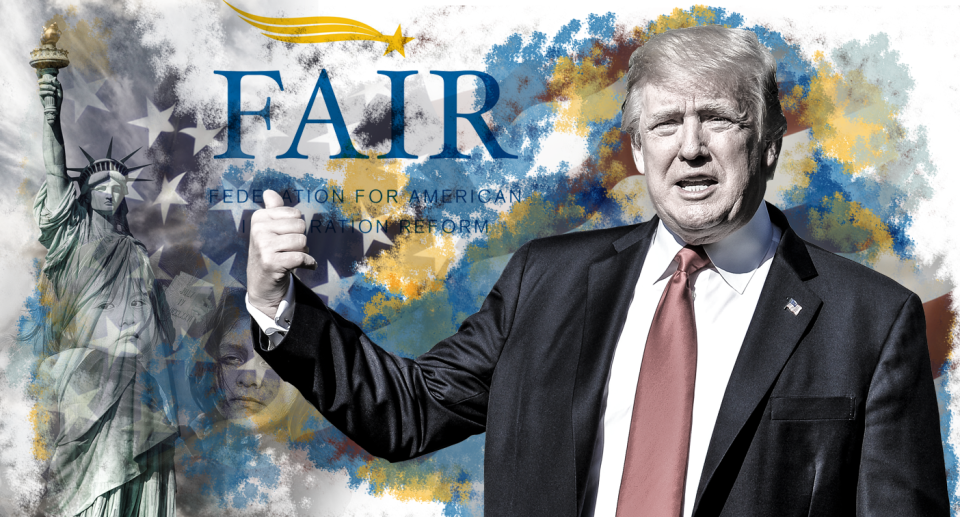Trump abruptly attacks 'chain migration,' a term that worries immigration advocates
President Trump echoed anti-immigration groups Friday morning when he suddenly condemned any new immigration policy that would allow “chain migration.”
“CHAIN MIGRATION cannot be allowed to be part of any legislation on Immigration!” he exclaimed.
Trump was referring to an immigration-policy concept that allowing immigrants to sponsor nonnuclear family members causes migration to surge. Critics of liberal immigration policies argue that one immigrant will sponsor several others, who in turn sponsor even more.
Heidi Beirich, the director of the South Poverty Law Center’s (SPLC) Intelligence Project, told Yahoo News that “chain migration” is a phrase “from the anti-immigrant world.” It is popular among groups that want to reduce legal immigration levels like the Federation for American Immigration Reform (FAIR), the Center for Immigration Studies (CIS) and NumbersUSA.

“They don’t like it because they argue that it brought all these kinds of ‘undesirables’ to the United States,” Beirich said.
Trump’s sudden declaration Friday could be of some comfort to immigration hardliners wary of his recent outreach to Democrats and young people protected by the Deferred Action for Childhood Arrivals (DACA) program.
Democratic leaders Sen. Chuck Schumer and Rep. Nancy Pelosi shocked Republicans Wednesday night when they announced that he had agreed not to deport the roughly 800,000 undocumented immigrants who had been shielded by DACA.
Trump has given Congress until March to come up with a new solution for reforming the immigration system after abolishing DACA, which was enacted by President Barack Obama. The Democratic leaders and Trump apparently agreed to an outline for a potential “DREAM Act,” which would legalize those former DACA recipients — there is some dispute as to whether citizenship is on the table — in exchange for additional border security measures. (Both Democrats and the White House have indicated that a border wall would not be part of the deal.)

But Trump’s anti-chain-migration position may complicate negotiations going forward, depending on what, exactly, Trump is insisting. White House press secretary Sarah Sanders demurred Friday afternoon when asked about the “chain migration” tweet.
“No deal has been … reached on this process,” she said during a media briefing. “He supports making an agreement on DACA. But that would have to include massive border security and interior enforcements.”
As for “chain migration,” Sanders said: “We’re going to be laying our what our specific priorities and principles are.”
Regardless, immigration supporters see attacks against “chain migration” as an attempt to shift the U.S. to a less diverse population.
Stuart Anderson, the executive director of the National Foundation for American Policy, argued that “chain migration” is a contrived term that tries to scare people but that almost all the people who would be sponsored by a family member come through within the existing numerical limits.
In a 2011 op-ed for Forbes, Anderson said wait times for immigrants sponsoring family members are already long because of the State Department’s annual limits and that there are U.S. citizens still waiting to be reunited with siblings in the Philippines who submitted application back in the Reagan era.

“The idea that you would have endless chains of immigrants coming in. It would take many decades,” Anderson told Yahoo News on Friday. “The idea that some family members come and years later sponsor another family member, that’s been part of American history since the 1600s. They are trying to put a negative spin on something that’s been taking place in America for almost four centuries.”
U.S. immigration demographics significantly changed as a result of the Immigration and Nationality Act of 1965, also known as the Hart-Celler Act, which abolished a national-origin quota system that favored immigrants from Northern and Western Europe. It was passed a year after the Civil Rights Act of 1964 and the same year as the Voting Rights Act.
With the Hart-Celler Act, family reunification replaced national origin as the main deciding factor on permitting hopeful immigrants. There have been smaller changes to the immigration system, but this legislation — signed into law by President Lyndon B. Johnson on Liberty Island in New York Harbor — set the basic structure that’s still in place today. It committed the U.S. to accepting immigrants from all nations on a roughly equal basis.
According to FAIR, one of the groups seeking to reduce both legal and illegal immigration, once this “family reunification system” was implemented in 1965, “chain migration” spiked: from 32,714 in 1965 to 79,213 in 1970. By 2001, 36 years later, the number of immediate relatives admitted into the country had reached 443,964. NumbersUSA said this resulted in the “sprawl, congestion and school overcrowding that damage Americans’ quality of life.”

The Trump administration has some ties to FAIR, which argues that less immigration “will allow America to manage growth, address environmental concerns and maintain a high quality of life.” Julie Kirchner, the former executive director of FAIR, is now the citizenship and immigration services ombudsman at the Department of Homeland Security. Jeff Sessions, who has spoken at FAIR events, is now the attorney general of the United States.
Beirich, of the SPLC, told Yahoo News there is no question that the number of immigrants went up because of the Hart-Celler Act.
“My problem with them is not that they’re saying there is more immigration than in the prior period. That’s true, and we can have a debate about what those numbers would be,” she said. “But my argument would be that their animus to the immigrants, which is demonstrated by the many statements they made over the years, has to do with them not liking where these people are coming from.”
Beirich paused for a moment: “They don’t like their skin color, in other words.”
Read more from Yahoo News:



